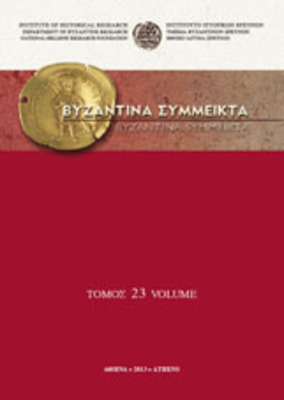Μαρτυρίες ιστορικών πηγών και αρχαιολογικών ευρημάτων για μια μορφή "βιολογικού" πολέμου με τη χρήση των μελισσών στο Βυζάντιο
Part of : Βυζαντινά Σύμμεικτα ; Vol.23, No.1, 2013, pages 91-104
Issue:
Pages:
91-104
Parallel Title:
Evidence from written sources and Archaeological finds for a type of «Biological War» using bees in Byzantium
Section Title:
γραπτές πηγές, αρχαιολογικά ευρήματα
Author:
Abstract:
The use of animals as a military weapon, particularly the sting of bees, doesn’t consist an invention of the Middle Ages. It is traced as early as the biblical times. First references are recorded during the Roman campaigns in the region of Pontus, while the lethal biological weapon of bees was further developed as a method of defense and attack mainly in the West, and especially during the Crusaders’ sieges. In all probability, Byzantium employed biological weapons, including bees,following roman practices. Literary sources from Patristic to historiographical texts and Saints’ Lives refer to the effect of smoke on bees, in a parabolic manner, and recognize the bees’ sting as a devious device against real enemies (e.g.barbarians) and invisible opponents (demons). Byzantine writers applauded the use of such insidious methods of warfare, on the other hand, the admiration of a victory, based on vigour and bravery was highly appreciated. Archaeological finds which could shed more light to this practice are scarce but indicative. Cylindrical earthenware vessels were the most common type of early Byzantine beehives, identified by the shallow incisions in the inner surface of the walls. Four intact samples of this type of pottery were found inside a tower of the Hexamilion Fortress at Isthmia (6th century), one of the most important military complexes of Justinian period. The unexpected location and the specific artifact types suggest alternative interpretations for their use, among them their possible military use. This paradox aspect of biological war did not die out, instead it inspired much more elaborated, devious methods of warfere in the aftermath of the Middle Ages
Subject:
Subject (LC):
Keywords:
στρατιωτική ιστορία, βιολογικός πόλεμος, χρήση μελισσών, Βυζάντιο, μεσοβυζαντινή περίοδος
Notes:
Αιώνες: 4ος - 13ος, 856:https://ejournals.epublishing.ekt.gr/index.php/bz/article/view/3782, DOI: https://doi.org/10.12681/byzsym.1046, Τα keywords δεν υπάρχουν στο πρωτότυπο τεκμήριο
Electronic Resources:




